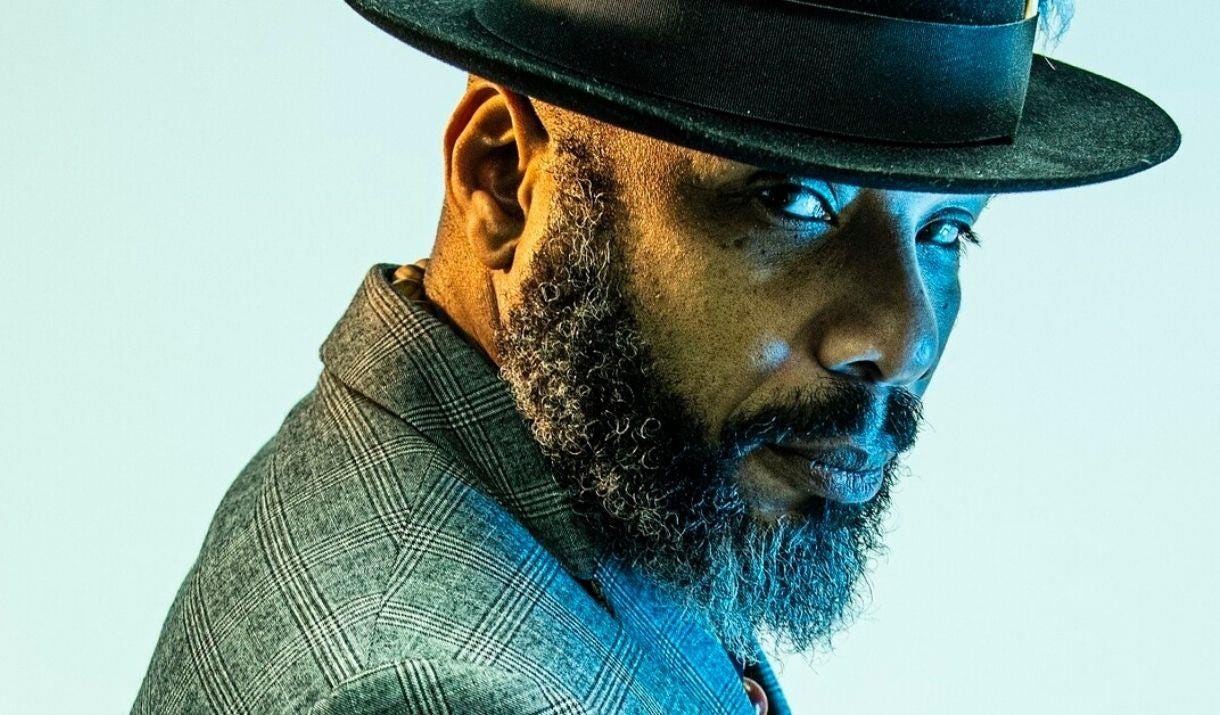On Anthony Joseph
Formal and Informal
This evening, we’re delighted to be welcoming the poet, musician and academic Dr Anthony Joseph to Avenue Campus.
I’ll briefly be introducing him to the audience, before he gives the FT Prince Memorial Lecture. (Book here.)
This is given annually, in celebration of the South African-born poet who helped found the English department at the University of Southampton.
Last year we had Andrew McMillan, talking wonderfully about anthologising queer poetries.
Anthony — who I know as a colleague from Birkbeck College — will be speaking under the title ‘Frequencies of Magic’, And will track —
the influence of 100 years of surrealism on his own development as a poet, novelist and musician. Starting with the Caribbean and moving towards the UK, where he moved to the late 1980s, Joseph shows how aspects of surrealism and surrealist practice are embedded within the Trinidad carnival, calypso arts and jazz, and how his own writing found allegiances with black surrealist writers such as Ted Joans, Sun Ra and Bob Kauffman while crafting a distinctly Caribbean surrealism. Joseph will share work from his newly published Precious and Impossible: Selected Poems (Bloomsbury, 2024)
All of which is fine, but as soon as I get to the names Joans, Ra and Kauffman, I start to feel irredeemably formal and square.
The language above is the safe language of presentation and representation.
In preparation for Anthony’s lecture, I’ve been reading his TS Eliot prizewinning collection Sonnets for Albert, and his new selected poems, Precious and Impossible.
These are not neat, summarisable texts. They are passionate, innovative and unsquare. Some are lyrics from subtly slinky songs. But here they are, neatly collected together by Bloomsbury Poetry, and published in a safely classic format.
This is an in-between territory of formality and informality that Anthony has been occupying, with great style, for a long time. Over thirty years.
Here is ‘Poetry’ from the Sonnets.
When I give my father a copy of my book, he looks
at the cover and says, ‘That is you and Dennis, where is that,
Ramkissoon Trace?’ He fans the pages with his thumb,
I watch until he pauses near the centre, to draw
his head back, to fix his eye to read. Then another few lines
before turning to the back and scanning
the surface of the sentences there. The bio and the blurb
are the things which make him smile.
I don’t think he ever read the poems.
But somebody told him that I had written about his travels
in the spirit world, to the Guinea coast, to China
in search of secret colours. And driving from the beach one day,
he said, ‘I hear you putting all my business on the internet.’
Then he laughed, but nothing else was said.
This is masterfully restrained, and very moving.
I’ve ended up using another tranche of formal language, when what I’d like to say is, Fuck, that’s so good.
to fix his eye to read.
But it’s the distance between son and father. It’s the —
I don’t think he ever read the poems.
that has Anthony Joseph placing his work exactly. He was, he knows, not necessarily a major concern of the man who was his major concern. He came to him in too formal a form, perhaps.
In an interview after his shortlisting for the TS Eliot Prize, Anthony talks beautifully about the sonnet form.
I started writing them in very strict form. Because I love the sonnet, I love the form, and I’ve taught it for many years. So I thought I’m going to write a crown of sonnets, in a very formal, you know, iambic pentameter, in the classic form. And then I’m going to see how it develops, and then I might change a few things. But I’m going to stick to the form. So I started. And then later on, as I kept going, I realised that my father’s voice was coming through in the poems and he was telling me, ‘You can’t put me into this straitjacket. You’ve gotta make it a bit more like me, like how I spoke.’ So I kind of changed them, and they became a different kind of sonnet.
Then he goes somewhere else, more general but more astounding — especially the final thing he says.
But the sonnet is — it’s an argument. The sonnet is an argument. And you open up the sonnet with a suggestion, and then you turn, and then you come to a conclusion towards the end. And I wanted to do that because a lot of this was me interrogating my own memory of my father. It was an interrogation of him, even though he wasn’t there. I was asking him, ‘Why weren’t you a great father? Why weren’t you there? Why did you do whatever you did?’ So this was the perfect form to engage in this dialogue with him. And of course, the sonnet — for me, the greatest sonnets that have moved me have been about love. And in a lot of ways I was finding the capacity to love my father in the form. Because the form forces you to confront yourself and your own emotions. And I found that I loved my father, even though he was not a great dad. So it’s about the capacity to love. I think the sonnet challenges your capacity to love.
What a thing to have reached the point of saying.
Something based on an acknowledgement of formality and its limits — something capable of breaking the heart; straitjacket before difference.
I am very much looking forward to this evening.



Sounds like this will be a wonderful evening. Enjoy!